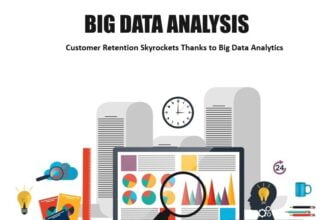The financial industry has undergone tremendous changes over the past decade. A lot of this can be attributed to big data. As advances in data become more impressive, new fintech solutions are reaching the market.
Predictive analytics is one of the most important big data trends affecting FinTech. Established financial companies like Payoneer and PayPal have already started using this new technology to improve their business models.
There are a number of applications for predictive analytics in these verticals. One of the biggest uses of predictive analytics is fraud prevention. Cyber fraud is a growing problem that is threatening organizations all over the world. Due to the massive volume in funds that are transferred every day, FinTech companies are some of the most attractive targets of cyber criminals.
A number of new predictive analytics algorithms have helped these firms identify potential fraudsters. Their fraud scoring algorithms use a number of variables, such as the nature of IP addresses, association with suspicious email addresses, region of the user and the believability of the names on their accounts.
Fintech companies also use predictive analytics to conduct risk analysis of potential borrowers. This has proven to be a great way to reduce the risk profile of their networks.
Growing the Fintech Industry Will Change Our Lives, Thanks to Predictive Analytics
The way that we work, rest and play has been shaped by technology. Smartphones, streaming, high speed broadband, WiFi and 4G are all embedded in our lives in such a way that many of us have forgotten what life was life before they all existed. In that environment, there’s little surprise that the way we manage our money – from banking to spending – also now owes a lot to technology. Contactless cards, mobile payments, banking apps, accounting software and automated business processes have all become mainstream in a fairly short space of time.
Fintech has become increasingly important all over the world too – with consumers keen to take control of their money and find a way to make their lives easier. People now expect a level of service that requires banks and lenders to be tech-savvy to cater for their needs.
But technology, as well know, doesn’t stand still. Contactless cards and mobile payments are less of a novelty – and apps hardly seem new now.
For many, the future lies in blockchain. This is the technology that underpins cryptocurrencies – digital-only payment methods such as Bitcoin – and could make transactions quicker, cheaper and safer. It’s already being used in many contexts around the world but there’s a general sense that we’ve barely scratched the surface.
Similarly, more and more businesses are looking into ways to offer payments in cryptocurrencies which suggest the potential for a diminished role for coins and banknotes. They’re popular in many emerging countries too – as they allow for people to bypass the need to develop a complex banking industry and open up access to finance for the previously ‘unbanked’.
Yet, while this is a technology that is largely unseen, there might well be many more obvious ways in which fintech changes. There is, for example, an argument that suggests banks should be implementing the use of robots to help with customer interactions and solving solutions quicker. RSB is an example of one bank that has offered this to its customers. Greater AI should allow for robot-advisers to play a greater role, offering a service beyond an ‘FAQs’ style function. Over time, robots might well help us with our mortgages and pensions too.
The flip side of that, of course, is that there might well be a need for a smaller workforce – both in terms of adviser roles but also for anyone involved in manual work within the banking and finance sector. Automation will have a huge impact on society as a whole – and it’ll be a big factor to watch in fintech especially. This could create tension, of course, and there needs to be careful thought about how to re-skill the workforce to find roles for people that fit with a newer, more digitally-led era.
Fintech has come a long way, but the progress won’t stop here. The things we do now will get quicker, easier and, hopefully, cheaper – while with blockchain, cryptocurrencies and AI we can expect new services that offer security and automation at a much greater scale.










